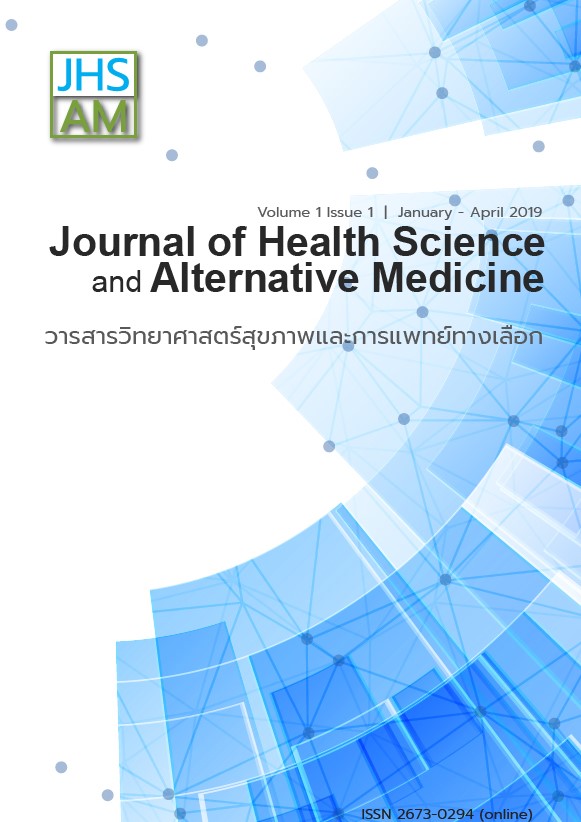Bronfenbrenner’s Ecological Model: Theoretical Lens for a Community-Based Research
Main Article Content
Abstract
A community-based research is used for addressing a complex situation in a community. It focuses on a people as a central of the development and also concerns all surrounding factors to move forward to achieve a better life of a person and a community as its ultimate goal. Bronfenbrenner’s model has been developed to improve the research method conducting in a community. The model involves person, process, context, and time to make change of a person by interaction with people and other environment in certain community. The model is used as a major of research method to improve community health today.
Article Details
JHSAM publishes all articles in full open access, meaning unlimited use and reuse of articles with appropriate credit to the authors.
All our articles are published under a Creative Commons "CC-BY-NC-ND 4.0". License which permits use, distribution and reproduction in any medium,
provided that the original work is properly cited and is used for noncommercial purposes.
References
[2] Stoecker R. Are we talking the walk of community-based research? Action Research. 2009; 7(4): 385-404.
[3] Minkler M, Wallerstein N. Introduction to community-based participatory research: New issues and emphases. In M. Minkler & N. Wallerstein (Eds.). Community-based participatory research for health: From process to outcomes. San Francisco, CA: John Wiley & Sons. 2010; 5-23.
[4] Pavlish CP, Pharris MD. Community-based collaborative action research: A nursing approach. Sudbury, MA: Jones & Bartlett Learning. 2011.
[5] Wallerstein N, Duran B. Critical issues in developing and following CBPR principles. In M. Minkler & N. Wallerstein (Eds.). Community-based participatory research for health: From process to outcome. Sanfransisco, California: Jossey Bass.2008; 2nd; 47-66.
[6] Lawang W. Developing support for Thai family caregivers of adults with a physical disability: A community-based action research. (Unpublished doctoral dissertation), La Trobe University, Melbourne, Australia. 2013.
[7] McLeroy KR, Bibeau D, Steckler A, Glanz K. An ecological perspective on health promotion programs. Health Education Behavior. 1988; 15(4), 351-77.
[8] 8.Telleen S, Maher S, Pesce RC. Building community connections for youth to reduce violence. Psychology in the Schools. 2003; 40(5), 549-63.
[9] Bronfenbrenner U. Toward an experimental ecology of human development. American Psychologist. 1977; 32: 515-31.
[10] Lewthwaite B. University of Manitoba Centre for Research in Youth, Science Teaching and Learning: Applications and Utility of Urie Bronfenbrenner's Bio-ecological Theory. 2011. Retrieved from https://www.mern.ca/monographs/Bio-Ecological.pdf
[11] Tudge JR, Mokrova I, Hatfield BE, Karnik RB. Uses and misuses of Bronfenbrenner's bioecological theory of human development. Journal of Family Theory and Review. 2009; 1(4), 198-210.
[12] Bronfenbrenner U. Ecological models in human development. In T. Husén & T. N. Postlethwaite (Eds.). Oxford, UK: Pergamon. The international encyclopedia of education. 1994; 2(3): 1643-47
[13] Bronfenbrenner U. Developmental ecology through space and time: A future perspective. In P. Moen, G. H. Elder & K. Luscher (Eds.). Washington, DC: American Psychological Association. Examining lives in context: Perspectives on the ecology of human developmen. 1995; 619-47.
[14] Bronfenbrenner U, Morris PA. The bioecological model of human development. In W. Damon & R. M. Lerner (Eds.). New York: Wiley. Handbook of child psychology. Theoretical models of human development, 6th edt. 2006; 1: 793-828.
[15] Bronfenbrenner U. Making human beings human: Bioecological perspectives on human development. Thousand Oaks, California: Sage. 2005.
[16] Bronfenbrenner U, Morris P. The ecology of developmental processes. In W. Damon & R. M. Lerner (Eds.). New York: Wiley. Handbook of child psychology : Theoretical models of human. 1998; 1 (5h edit): 993-1023).
[17] Bronfenbrenner U. Ecology of the family as a context for human development: Research perspectives. Devekopmental Psychology. 1986; 22(6): 723-42.
[18] Mcmillan BW. An ecological perspective on individual human development. Early Child Development and Care. 1990; 55(1): 33-42.
[19] Washington L. A contextual analysis of caregivers of children with disabilities. Journal of Human Behavior in the Social Environment. 2009; 19(5): 554-71.
[20] Adamsons K, O'Brien M, Pasley K. An ecological approach to father involvement in biological and stepfather families. Fathering: A Journal of Theory, Research, and Practice about Men as Fathers. 2007; 5(2): 129-147.
[21] Schiamberg LB, Gans D. An ecological framework for contextual risk factors in elder abuse by adult children. Journal of Elder Abuse and Neglect. 1999; 11(1): 79-103.


